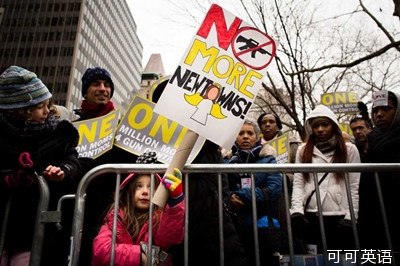The debate over gun control in America has been ongoing and intense for many years — with proponents seeking to reduce gun-related injuries and curtail criminal activity, and opponents sighting second-amendment rights and the need to defend themselves. Despite the complexities of differing opinions, sometimes there's been enough agreement for legislation to pass Congress.
在美国关于枪支管制的争论已经持续多年,且日益激烈。支持者希望以此减少枪支相关的伤害,降低犯罪率,然而反对者则着眼于第二修正法案以及防御的需要。尽管双方意见不同,情况复杂,但有时仍有足够的协议让国会通过立法。

The first major gun control act was passed by Congress in 1934, regulating the sale of fully-automatic fire arms, like machine guns, after an assassination attempt on President-elect Franklin Roosevelt and a series of organized crime killings. In 1938, a further restriction required licenses for gun dealers, and prohibited gun sales to people who had committed a violent felony.
在有人企图暗杀总统富兰克林·罗斯福以及一系列有组织犯罪事件之后,国会于1934年通过了第一条主要的枪械管制条令,规范了全自动武器的销售,比如机关枪。1938年,国会进一步出台限制,要求枪支经销商持照经营,并禁止向有犯罪记录的人销售枪支。
The 1963 assassination of President John Kennedy—which was committed with a mail-order rifle—and the subsequent assassinations of Martin Luther King and Senator Robert Kenndey in 1968, led Congress to pass additional legislation. The Gun Control Act of 1968 added many restrictions on who could import, buy, and sell guns, and established harsher penalties for those using a gun in the commission of a federal crime. The debate on gun control remains an intense one across the country today—making this a particularly difficult issue to tackle.
1963年,肯尼迪总统遭遇刺杀,而犯罪工具是一支邮购步枪,随后相继发生的马丁·路德·金和参议员罗伯特·肯尼迪遇刺事件,促使国会通过了附加法。1968年的枪械管制法案增加了很多对进口和买卖枪支的限制,并且针对那些使用枪支触犯联邦法律的行为采取了更为严厉的处罚措施。如今枪支管控在整个国家仍是热议的话题——这让枪支管控变成尤为棘手的问题。
来源:可可英语 //www.utensil-race.com/Article/201305/241404.shtml












